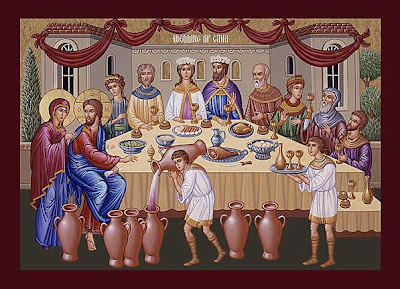Water into Wine
On this Sunday we remember the wedding at Cana. This event includes the first recorded miracle of our Lord and the last recorded words of our Lady.

On the third day of his public ministry, Jesus and his disciples were invited to a wedding. Mary His mother was there too. When they ran short of wine, she spoke with her son, and at her intercession, He turned water into wine. As with the miracles that followed, this was no random magic trick, but was an exercise of Divine power that revealed something of the Divine plan.
Above all, it is a foreshadowing of his last miracle, also a miracle of "good wine", the third cup of the passover meal which He celebrated with His disciples, the cup of redemption that held no ordinary wine, but by God's mercy held the Precious Blood shed for our salvation.
At every Mass, the chalice holds the Precious Blood, a gift freely given, so that we might be unified in Christ, and raised to a greater dignity than we now display, raised so high as to even share in the Divine life and enter heaven at the end of our days.
The miracle of the Mass is a miracle of water and wine, recalling the water and the blood that flowed from our Lord's side at his crucifixion. The priest adds a drop of water to the cup of wine about to be consecrated. Saint Thomas says that the wine signifies Christ's blood, and the water, the people (ST III, q 74, art. 6). In a sense, the water is changed to wine in the cup. It is still present, but it has become one with the wine, and cannot be separated from it. May we be so joined to the True Vine [John 15:5], Christ our Lord, and give forth fruit abundantly. [Galatians 5:22-23, also Romans 1:13 and Colossians 1:6]
In marriage, man and a woman are inseparably joined for life. Choosing a wedding as the setting for His first miracle emphasized the unfailing, self-sacrificing love the Lord has for His chosen bride Israel [Mark 2:19, Ephesians 5:22-33]. His presence at the wedding also sanctioned marriage as a holy and honorable institution.
In the Bible, seven is the number of perfection and covenant, and one less than that is the number of imperfection. Some people note that six empty jars were filled, and consider that a symbol of the imperfection of the old law, and the emptiness it left in God's people, which is filled up beyond all expectations by the new wine of Christ.
However imperfect the materials at hand were, the Lord did not reject them, but worked with them and through them and filled them to the brim with His gift to bring joy to people who needed his help.
At that time, then, Jesus made of water wine, and both then and now He ceases not to change our weak and unstable wills. For there are, yes, there are men who in nothing differ from water, so cold, and weak, and unsettled. But let us bring those of such disposition to the Lord, that He may change their will to the quality of wine, so that they be no longer washy, but have body, and be the cause of gladness in themselves and others. But who can these cold ones be? They are those who give their minds to the fleeting things of this present life...
Saint John Chrysostom, Homily 22
The positive response of Jesus to our Lady's intercession should increase our confidence that her prayers can help us, too.
Finally, it might be noted that while His disciples' faith was strengthened by His miracle, most of those in attendance at the wedding were not followers of the Lord. But all benefitted, for God loves all, and sends rain for the just and unjust alike [Matthew 5:45].
(Sources: 1, 2, 3, 4).
(As I was finishing this post, I discovered an excellent series of excerpts on this same subject from Fulton Sheen's Life of Christ, posted by the Happy Catholic: 1, 2, 3, 4, 5)
I have been crucified with Christ and I no longer live, but Christ lives in me. The life I now live in the body, I live by faith in the Son of God, who loved me and gave himself for me.
Galatians 2:20
Come, all you who are thirsty,
come to the waters;
and you who have no money,
come, buy and eat!
Come, buy wine and milk
without money and without cost.
Isaiah 55:1
The wedding at Cana is one of the new luminous mysteries of the Rosary in the expanded version of the Rosary introduced by Pope John Paul II, and is also one of the meditations in the now rarely prayed Eastern Orthodox rosary.
Labels: Cana, our Lady, our Lord, Precious Blood, sanctification



